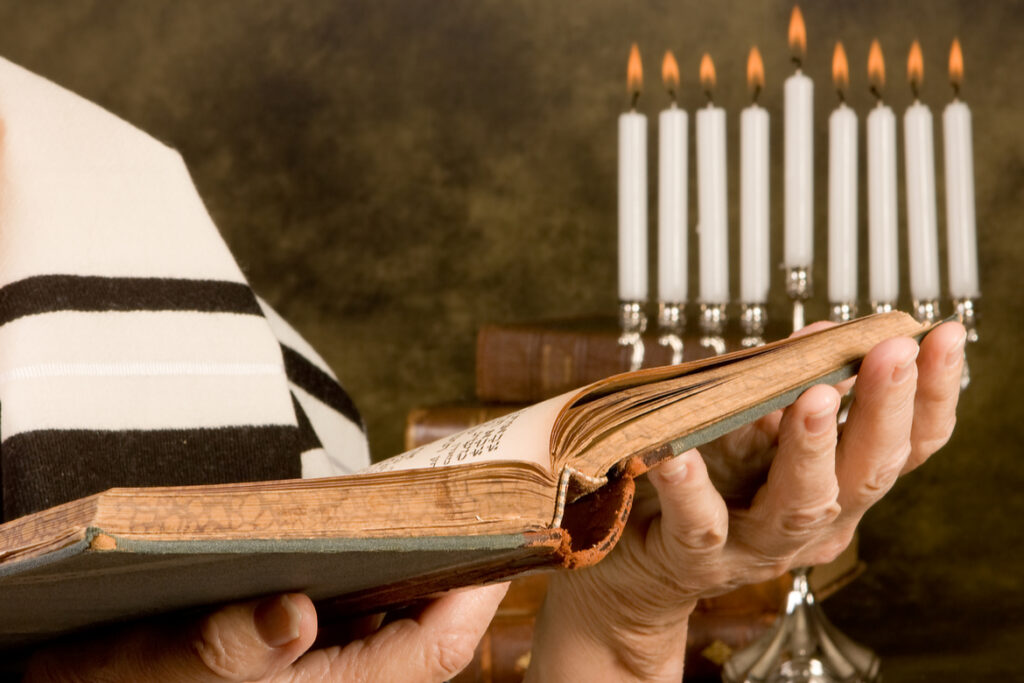For Breslov Woman – A New Series
I’ve been asked to contribute a regular blog on women and Breslov, which seems a bit like stepping out into uncharted territory. But one thing we learn from Rabbeinu is the value of azus d’kedushah, holy chutzpah, and if I’m going to throw myself into the task I ought to do it courageously. So I’ll start off strong and see where it takes me, and may Hashem be my guide.
Rebbe Nachman posed to his followers, “Why don’t you turn your wives into chassidim?”[1] With Rosh Hashanah just around the bend, maybe he merely meant that if you don’t have cooperative wives, they won’t let you leave the family? Or perhaps he said this as a means of smoothing the marital waters–if a wife doesn’t appreciate the value of letting her husband go out to learn through the nights, spend time in the field in private communion with Hashem, living a life of simplicity and faith, then how can a husband follow Rebbe Nachman’s path? I’m sure that there are people within the wider world of Breslov who adhere to this view of the Rebbe’s statement, but I was taught something different. That first viewpoint is true, but I am sure that he meant so much more.
“Why don’t you turn your wives into chassidim?” is the Rebbe’s finger hooked inward and beckoning us, the women, to follow him on his old-new path—and what a breath of fresh air and a burst of light it is for us! The sages taught the greatness of being a facilitator of the avodah of another; Rebbe Nachman taught me that my avodah has its own value as well.
We tend to think that, as women, we are tied down into these small boxes of action: family, home, work, community. What is this great avodah that I can also offer Hashem? I was taught that there is almost nothing as important as my discovery of Him within my boxes, within the place of constraints and limitations. And I have a feeling that we are going to learn one day (and I really hope that it’s soon) just how otherworldly is the light generated by our attempts to reveal Hashem’s presence within the most minute and mundane of vessels—places, times, objects and circumstances.
As this blog unfolds, I hope to write about the different ways that this can be accomplished, with Hashem’s help.
Gut voch!
Yehudis Golshevsky
[1] Siach Sarfei Kodesh I:14
- 31 comments























31 Responses
Yehudis:
what an honor and privilege to be able to learn from you in yet another avenue. Finding the miraculous in the seemingly mundane, not an easy task, and is part of our mission in the world.
looking forward to yehudis golshefsky’s great insights into the torah and breslov world
thank you!
First of all…I am so beyond excited about this because I need this very much! I am thrilled to have a place to read and post and interact on my questions about Rebeinu’s teachings- which is more times than not very hard to understand. And thank you Rabbi Chaim Kramer for choosing Rebetzen Golshevsky….this is so amazing. I am telling everyone I know about this.
In regards to this post… I have heard this concept numerous times; it is the job of the women to take our mundane routines and lift it high by giving value to each seemingly small thing we do….but how does this make us chassidim? Isn’t the definition of chassidim mean people who do above and beyond the letter of law? (I am assuming Rabbi Nachman wasn’t saying “chassidim” in this quote with the understanding of how the Tanya defines a “chassid”:-)
beautiful….a burst of light for us all…I love that and being a facilitator of another’s avoda…what a thought….he’s telling the men to facilitate our avoda? And we their’s sometimes too….oh that’s why…maybe they get us on board, then we keep them on board…
And we woman need to remember that Hashem is in the details! Hashem is on the other side of the sponga!
Looking forward to reading more of your Torah’s.
Dear Chaikie:
Thank you for the kind words… Soon, b’ezras Hashem, we’ll have a chance to learn together face to face again.
YG
Dear Sarah,
Although you’re right about some of the more specific definitions of chassid, I would think that in this statement Rabbeinu means it in the vernacular sense: a follower, a disciple. We can understand the idea of a man being the disciple of a rebbe–he has at least some degree of access to the person of the rebbe and his teachings. For a woman, finding ourselves as “chassidim” is quite a bit different. I would say that outside of Breslov and Chabad, I don’t know that there is such an idea at all, of women developing a strong chassid-rebbe bond beyond that of faith in the tzaddik as a part of his flock. Clearly, Rabbeinu meant something more specific than that, because otherwise why would he pose to his students that they go and “make” their wives into chassidim?
The idea of revealing G-dliness specifically within the “little boxes” is the essence of chassidus, I would think. The light of lofty Torah is powerful enough to illuminate down to the lowest places.
Brachah,
When I said the facilitator of another’s service of Hashem, I meant in the way that we’ve already all known: a woman has an equal share in all of the Torah study of her husband and children because she makes it possible. That’s not news. What was news to me was the awareness that I also have a unique contribution to make in Divine service particular to the circumstances and limitations of my own female experience, and that it is very valuable to Hashem. I don’t have to be a “chassidiste”–there is also a way for me to be a chassid.
And, yes, I do think that there’s mutuality there. At least, this is the lesson I learned from my teachers in Breslov, and my husband also learned it. Of course, everything within limits, but when a husband is generous with his wife and allows her some space for her own spiritual development, it shows that he respects her soul. This is a big topic, but I would just add a caveat that such mutuality assumes that a wife already is very aware of her obligations to the family and does not have a problem with misplaced priorities.
This is a very exciting development! Looking forward to more posts….
Yehudis, this is awsome. A real oppertunity to be reminded of the joy of being a woman. The Torah you give over gives us all this joy by being able to connect to our creator Hashem in all we do. This is an amazing avinue which allows us to fit it into our little pockets of time through our buisy lives to open our awareness of what we are doing here as Jewish women. Real joy.
Hi, Yedudis, Hashen has let me find you through the internet. I have tried to connect to you when I was in visting Israel but never could. Thankyou, both of you, for always answering my prayers.
Hi Leah,
Were you in touch by e-mail before you came? If you have anything you want to discuss privately, you can always send me a letter directly.
Wishing you every good,
Yehudis
Yes, yes! More Yehudis! I am very glad to have access to you without having to be in Jm.
Just to give you a little bit of a hard time – as is my wont – I don’t think husbands can “make” their wives anythng. It is hard enough to make oneself change – especially into a chassid, much less make someone else change. Seems to me the best he can do is be a chassid himself, vis-a-vis his rebbe, and be a rebbe vis-a-vis his wife. Then, given the model and the opportunity, she can make herself a chassid. What do you think?
Much love, and so happy for this venue. Is there a way to sign up to be notified when there are new posts?
E
Well, let’s just say that I can see it from that perspective, but I still appreciate this pekudah of the Rebbe–must have been a little surprising for the talmidim. Two hundred years ago, who ever heard of a Rebbe telling his students to go home and share what he’d learned from his Rebbe with his wife? (It’s not terribly common today either.) This is the sense of “make them chassidim,” I think.
Much love right back to you, but I still would like to see you in Yerushalayim.
In terms of signing up, look to the top right-hand corner of the page and you’ll see options for getting notifications.
Yehudis
So excited to get more Yehudis! Maybe there could be a 24 channel?
Also, I think this is a worthwhile place to post about future trips to the Rebbe…..
With gratitude to Yehudis, BRI, and the H-ly One
Bring it on!!
yes , that was me. thankyou for that opportunity. There is so much I need help with. I don’t know where to start, so many questions go unanswered. Maybe one by one I could get help. Love Leah
There is something I want to ask you. I’m a freind of Bracha Din and she suggested I contact you, you might be able to help me.
Can you please let me know how I can get to speak to you?
My phone number is 054 845-6509. Or you can send me an email to [email protected]
Thanks, Chaya Gitty
Check your e-mail, Chaya Gitty. I’ve sent you a note.
B”H
what an important endeavor, May hashem bless you
Rabbenu gave us Likutei Eitzot, we have Baruch Hashem Likutei Moharan. Likutei Halachot, Chayei Moharan etc. Rabbenu teaches that to be attached to the Tzaddik a person must come to his kever; that one can “see the face of the Tzaddik through studying the holy letters of his teaching; that he can be attached to the Tzaddik by following the Tzaddik’s advice, and as I heard Rav Ofer Erez shlita say in a shiur “Rabbenu is the great healer, and the medicine he has given us is hitbodedut”; Rabbenu spoke of confessing to the Tzaddik, of giving tzeddaka to the Tzaddik….
imho all of the above can certainly be the aspirations we women can Bs”d b”n strive for as much as men…
the Holy Baal Shem Tov teaches us that we must seek the teaching in every encounter and experience, to try to understand how we learn from it how to grow closer to Hashem. Rabbenu tells us that we must seek out the “sechel” in every thing. In Torah 54 Rabbenu speaks very clearly how any Jew can unite heaven and earth through even the simpliest of actions, even through sleeping!
Dear Gita,
This is exactly what I was hoping to hear from someone–the extent to which Breslover women have access to so many enlightening teachings that literally open a pathway in avodas Hashem for us exactly where we are. Thank you for the strong teachings!
PLEASE NOTE:
There was a problem with the subscribe by email button on the top of the screen. If you used it please do so again or you will not be able to received new blog posts automatically, thanks and sorry for the technical issues.
BS’D
Dear Yehudis, Thanks to you and your family for making teaching a priority, it is a true chesed. Looking forward to future posts!
Dear Yehudis,
I am a friend of Ida’s and I am honored to read of your learning and teaching. We all learn together and grow closer to Hashem each time-bringing spirituality into our homes and setting an example for our families. I look forward to being part of your group in Eretz Yisroel very soon. B”H
My very best to you and your family,
Chaya Levy
thank you for sharing your time with us for inspiration and chizuk.how can you be reached in israel?
Dear Chaya,
I also hope to see you in Yerushalayim as soon as possible. Wishing you every good,
Yehudis
Yay!!! What a great new opportunity to learn with Yehudis! Thank you, thank you. I like this lesson very much. I remember hearing it in your living room and it still resonates with me and has continued to develop over time. Finding Hashem in all of the little parts of my day and life – I even have some post-it notes around as reminders! Wishing you much hatzlacha with the series! Looking forward to future installations.
Dear Rachel,
So good to know that you’re tuning in. Yes, it’s a non-stop avodah, but that’s its greatness–always accessible. Not confined to a class, a book, a teacher, a synagogue.
p.s. It does look like the meeting will have to wait until after Rosh Hashanah…
Very exciting to finally have articles about women in Breslev (versus articles written by women in Breslev)!!
I am looking forward to your posts.
May you and your entire family be blessed with all good for the new year.
Please, how do I subscribe to this Blog? The “subscribe” button at the top left of the page isn’t working for me. I would like very much to receive the latest blogs by email. Thank you very much, Ms Sandi in Kentucky USA
I just discovered this, and I am very happy to have found this. I am trying to feel more connected to haShem, to unite my womanly pursuits as a wife, mother, and homemaker with the longings of my soul to connect to haShem. I hope this pursuit (to write blogs for women) is still continuing! I will try to subscribe–and hope it works.
I can’t seem to subscribe to this series. I don’t know if Rabbi Katz and/or Rebbetzen Golshevsky monitors these comments : ) but if you do, would you please put a button somewhere on this page to subscribe to posts that are for women about Breslov (as this post seems to be advertising). I would be very interested in subscribing.
Thank you!